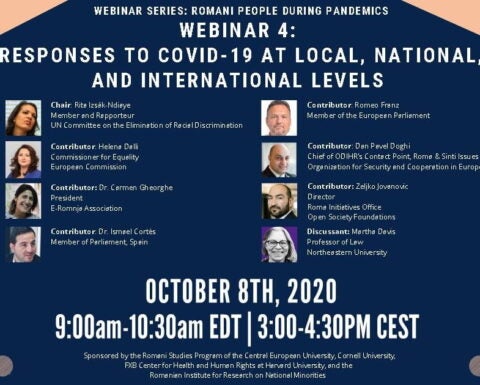Webinar: Responses to COVID-19 at Local, National, and International Levels

Date and Time
On October 8, 2020, leading scholars and activists will discuss the additional challenges and risks Romani people are facing during the COVID-19 pandemic during a webinar, “Responses to COVID-19 at Local, National, and International Levels.” The event will be held from 9 to 10:30 a.m. EDT (3 to 4:30 p.m. CEST). The event will be streamed live on the Facebook page of the Central European University Romani Studies Program.
Speakers








About the Webinar Series
This event is the fourth and last in the four-part webinar series, “Romani People During Pandemics.” The webinar series aims to:
- Discuss past and present patterns of fearing or blaming Roma during pandemics and place these patterns in the broader history of scapegoating in times of crisis.
- Draw attention to various responses chosen by state representatives and their rationale. We will discuss discriminatory measures by local or state institutions who imposed Roma-only, disproportionate, or militarized measures in Romani neighborhoods or towns.
- Focus on effective responses implemented at local, national, or international levels by state and non-state actors to protect Romani people, their health and well-being in times of pandemic and outside of them.
This webinar series is being organized by the FXB Center for Health and Human Rights at Harvard University, the Romani Studies Program of the Central European University, the Romanian Institute for Research on National Minorities (ISPMN), and Cornell University.

